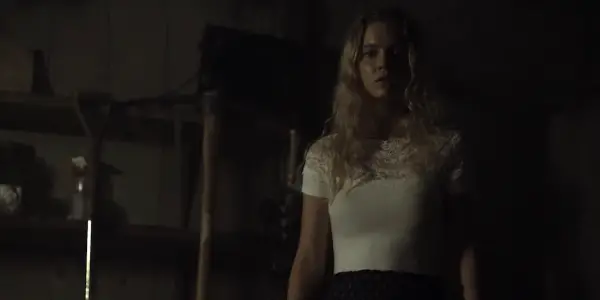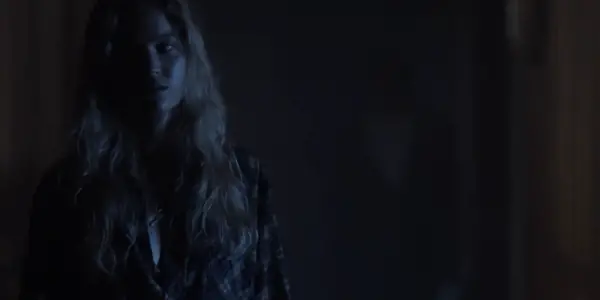#LIKE: A Sharp, If Blatant, Take On The Feminist Revenge Thriller

Zoe Crombie is a Film Studies student from Lancaster University,…
I’m guessing that right now, having clicked onto this review (thank you), you are probably pondering the title of this film, and how I possibly could have given it a predominantly positive – if somewhat critical – review. Unfriended, Selfie From Hell, #Horror: these are all films that use some kind of internet-born terminology as their first impression, and they all have in common their abysmal quality and embarrassing understanding of technology, particularly of how teenagers and young people utilize it.
Thankfully, #like bucks this trend not just by presenting a teenage girl using the internet in a realistic way, but also by being an interestingly ambiguous thriller that, while a little on the nose, actively encourages you to constantly rethink what you’ve been shown – not just by this film, but by many others in the genre.
Premise And Pacing

Rosie, a popular teen from an idyllic neighborhood, is revealed over the course of the opening to be mourning the loss of her sister Amelia, who was murdered one year earlier by an unknown man who also sexually exploited her. As implied by its place in the rape-revenge film canon, she uses her knowledge of both social media and her sister to track down the murderer – but did she find the right man, and ultimately, does it matter?
Well, in my opinion, if you can suspend your disgust at the brutality committed against a potentially innocent man, then you may find some interesting takes on violence against women, ranging from catcalls to rape and murder. The film takes some time to reach this point, however; while the physical aggression in the second half feels unnecessarily gratuitous at times, the first half brilliantly showcases the everyday aggressions that women experience, and how this undercurrent of misogyny can lead to tragedies like the film’s central mystery. This should really have continued for longer – finding the possible assailant felt like the climax, the long remainder of the film therefore serving as a bloated and convoluted conclusion.
Performances

Sarah Rich has the task of carrying much of the film by herself as Rosie, and she more than lives up to this complicated role. Up until some of the crueler moments of the last third, in which her motivations become increasingly harder to understand, Rich is refreshingly normal, looking and acting like many teenage girls I’ve known, but with a tinge of sadness and sobriety that you can tell is masking her previous, more joyful nature. Marc Menchaca, credited only and appropriately as ‘The Man’, brings a gruff yet intriguing ambiguity to his enigmatic character, adding to the Noir feel but still subverting the generic expectations by being largely a step behind the sympathetic femme fatale. As the final standout in the brief scenes in which she appears, Samantha Nicole Dunn is believable and heartbreaking as Amelia, providing through the preferred preteen medium of YouTube a desperate performance similar to that of Elsie Fisher’s turn in Eighth Grade, albeit in a grimmer context.
Quiet And Chaos

It may take place in a secluded woods and a dilapidated basement, but #like certainly doesn’t fit into the horror cliches you may assume it does. For one, the forest isn’t shot like a place of danger – the wide expanse allows Rosie to quietly exist in solitude, ruminating on her pain in relative peace. You sometimes feel as though you’re waiting for a hockey mask-wearing monster to come and wreak havoc on our final girl, but he never arrives, and you’re instead left to wonder who the monster is that let the cruel death of an innocent occur. Going on your phone or laptop to browse Facebook is usually seen as a muted, unassuming pastime, but here director Sarah Pirozek allows this quiet action to take on a more sinister edge, suggesting the scale of the danger that can be found on the internet without explicitly revealing every detail. The result is a chaotic, nihilistic world presented through a solemn, silent lens – violence against women occurs not with a bang, but with a whimper.
Conclusion: #like
Rosie isn’t always an easy protagonist to like, and #like isn’t always the most entertaining film to watch, but Pirozek’s meditations on everyday sexism and the slippery slope towards violent misogyny are valuable and noted, especially as they come from a film with a largely female vision behind it. Beautifully made considering its micro-budget, and surprisingly intelligent considering its title, #like is not to be underestimated.
What did you think? Does #like provide the thrills it promises? Let me know in the comments!
#like was shown at the Brooklyn International Film Festival on June 1, 2019.
Does content like this matter to you?
Become a Member and support film journalism. Unlock access to all of Film Inquiry`s great articles. Join a community of like-minded readers who are passionate about cinema - get access to our private members Network, give back to independent filmmakers, and more.
Zoe Crombie is a Film Studies student from Lancaster University, who has been writing for Film Inquiry since May 2018 as well as at her own site Obsess Reviews. She is a big fan of Studio Ghibli and The Marx Brothers, but is willing to watch anything and everything.













